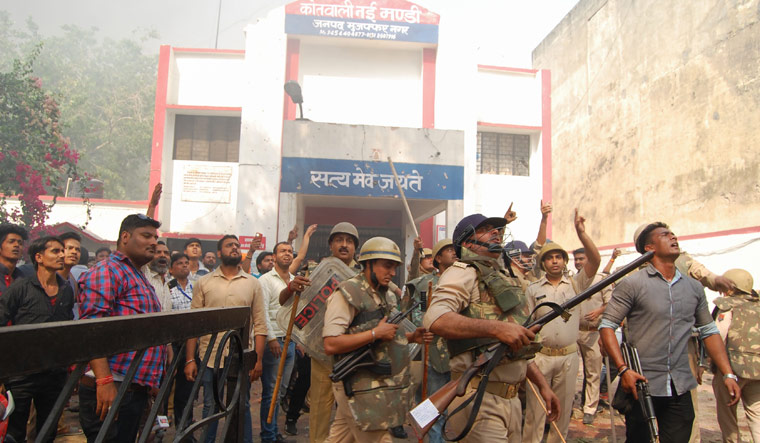When Padmaavat was released on January 25, Uttar Pradesh was one of the few states that did not witness large-scale violence. The movie was screened in 77 cinema halls across the state where Karni Sena activists greeted cinema goers with bouquets persuading them not to watch the movie. Two months later, the scene is quite different in Uttar Pradesh where the dalit agitation has taken an ugly turn, resulting in two deaths, several injuries and a breakdown of law and order.
In an interview with THE WEEK, the state's Director General of Police Om Prakash Singh said the UP Police did not receive intelligence inputs from any Central agency about the nationwide dalit agitation rising to this level even as he pointed to the role of some politicians belonging to certain political parties in orchestrating the violence.
What is the reason behind the dalit agitation going out of control in UP?
I won't say that it went out of control but we had got information that the dalit agitation won't be so robust. A number of small groups may take out processions peacefully and hand over their memorandums to the authorities. But the mobs were emotive. The agitation started in the wee hours and the mob was in full force. By the time we reacted to their nefarious plans, they had indulged in violence and caused some damage.
But we managed to contain the violence. We have reasons to believe that politicians belonging to certain political parties were instrumental in instigating the protesters and orchestrating the violence. Certain anti-social and anti-national elements also mixed with the crowds. We have video footage from the affected areas and we are in the process of identifying such persons. We are also investigating the role of any outsiders like student leaders and others who were part of the conspiracy to stoke unrest in the state. Nearly 50 civilians and 95 policemen have suffered injuries in the violence.
Was it an intelligence failure that has resulted in large-scale violence?
We did not get intelligence inputs from any Central agency that the agitation can grow to such a large scale. But we had made our own intelligence assessment and deployed police personnel on the ground. It was not expected that the mob will turn so violent. There were also sporadic incidents in several parts. We have requisitioned eight companies of the Rapid Action Force for deployment in Muzaffarnagar, Meerut, Hapur and Agra, which were the most affected. The Provincial Armed Constabulary (PAC) has also been deployed in the state and a total of nearly 15,000 state police personnel are on the ground besides the Central paramilitary forces.
What action is being taken against the culprits?
A former MLA of a certain political party has been arrested for playing a key role in the violence in Meerut, Hapur and nearby districts. More than 500 arrests have already been made and 125 cases have been registered in all the affected areas. Strict action will be taken against the guilty. Some more action is likely once we have gone through the video footage.
Is the UP Police well-equipped in terms of manpower and equipment?
We have a shortage of manpower and will be recruiting 35,000 additional policemen in the next one year. We are also experimenting with non-lethal weapons to use them in a big way to handle such protests. But if the mob starts attacking the police and vandalises public property, we are constrained to use force.
However, I would say there has been a massive improvement in law and order in the last one year. We are giving a new face to policing in UP and have already managed to instil a sense of security in people. The policemen are being trained in soft skills to make them more people-friendly and humane. We are taking prompt action against any policeman indulging in high handedness or dereliction of duty. Recently, five policemen were suspended in Shahjahanpur for their act of high handedness.
We are heavily focussing on use of technology, preventing crime against women and improving cyber surveillance. There are cyber cells in Noida and Lucknow, but we plan to restrengthen and restructure them and expand our network. The Crime and Criminal Tracking Network and System (CCTNS) project of the Central government has already been rolled out in the state. Soon, we will have e-registration of FIRs. In the last few months, we have successfully busted terror-funding networks spread over UP,Madhya Pradesh and Nepal. We did a lot of spade work to crack down on the mass copying in Uttar Pradesh board examinations using electronic surveillance techniques. Presently, we are also assisting the Delhi police in the CBSE paper leak case.
During the Padmaavat controversy, other states witnessed violent protests but UP did not. Your comments on this?
It was the qualitative and innovative strategy of the UP Police that was responsible for the peaceful screening of the movie in 77 cinema halls across the state. We were talking to both the parties and it was a result of a lot of persuasion and negotiations that there was no violence when the movie was released. There was collection of ground-level intelligence, deployment of police force and a number of meetings were held in advance. Chief Minister Yogi Adityanath was monitoring the situation. The district magistrates held a video conference to exchange notes and discuss strategies.
We had also warned the Karni Sena that if there is violence, it will be dealt with sternly. So when the movie was released, activists of Karni Sena were giving bouquets to cinema goers trying to convince them not to watch the movie. But there was no violence. Other states may not have planned as well, which is why there was violence in other parts. The reason why we couldn't replicate it this time during the dalit agitation was that they (the protesters) had nefarious designs and there wasn't anyone who was willing to talk.


